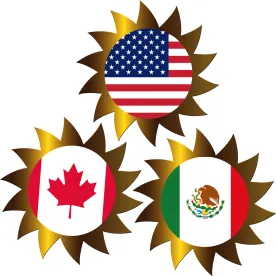On September 30, 2018, the United States, Mexico and Canada reached an agreement on the renegotiation of the North American Free Trade Agreement (NAFTA). The text of the proposed new United States-Mexico-Canada Agreement (USMCA) was released shortly thereafter, setting the stage for the Congressional review period, signing, and ratification process required by Trade Promotion Authority (TPA). Given the timing requirements under TPA, as well as the ratification process required in each member country, the new agreement will not take effect until sometime well into 2019. Until then, NAFTA continues to be in effect and controlling.
The text of the USMCA includes a host of changes that will impact the substantive duty-free qualification of a variety of products, with the most significant changes impacting the automotive industry. The USMCA also sets forth a variety of procedural changes that many in the trade supported to streamline the entry and duty preference claim process, as well as facilitate qualification.
Some important changes and renewed provisions include:
- Certificate of Origin – A formal Certificate of Origin will no longer be required under the USMCA. Instead, the preferential claim can be made in any form, including on the commercial invoice or other transaction document. The agreement lists the required data elements for certification, regardless of what form that certification takes. In addition, USMCA origin claims can now be certified by the importer of record, a requirement previously reserved for the exporter.
- Support for Claim – The importer must have all required support to certify a USMCA claim at the time of entry.
- De Minimis – Increase in the value of non-originating goods that may be used under the de minimis provision from 7 percent to 10 percent.
- Fees – The USMCA will continue to allow for an exemption of merchandise Processing Fees for qualifying products upon making a valid duty preference claim.
- Post Entry Claims – Duty preference claims under the USMCA can still be made up to one year after the entry date.
- Verifications – Under the proposed USMCA, verifications for duty preference qualification will still be authorized, allowing the customs authorities of one country to review the producer or exporter records in another country, and will now also provide for audits of the importer who made the duty preference claim.
- Automotive Rules of Origin – As had been reported, the following conditions on automotive imports will be staged in over a three-year period:
- There is a maximum five-year transition period after the agreement enters into force for the regional value content requirement for autos to increase to 75 percent, from a current 62.5 percent.
- The agreement requires 40 percent of vehicle value to be made in high-wage factories paying $16 an hour, which is expected to shift significant automotive production to the United States and Canada.
- The agreement also requires that vehicle manufacturers source at least 70 percent of their steel and aluminum from within the three countries.
- Importantly, certain vehicle types, such as off-road vehicles and mobile homes, are omitted from the definition of “passenger vehicle,” relieving them from the updated requirements.
- Automotive Side Letter – Canada and Mexico will be protected from potential Section 232 tariffs on automobiles through a side letter to the agreement. The letter provides for a quota of 2.6 million imported passenger vehicles from both Canada and Mexico in the event that the administration moves forward with tariffs. The quota amount is reportedly slightly larger than the number of vehicles Mexico has exported to the United States over the last year, and nearly 1 million more than Canada has exported.
- Other Rules of Origin – Although the focus of most discussions regarding the rules of origin was on the automotive industry, initial reviews of the rules of origin relevant to other industries suggest that changes were made in other sections. We recommend careful review of the rules of origin as they relate to your industry and products to ensure changes are identified and considered.
- Sunset Clause – The updated agreement includes a clause providing for a 16-year initial term for the agreement. After that, the agreement will be reviewed every six years, and extensions can be made without limits on extension terms.
- Trade Enforcement and Dispute Settlement – The USMCA preserves the Chapter 19 trade dispute settlement mechanism, a concession Canada fervently demanded leading up to finalization. New provisions were added that allow for closer cooperation between the signatories in the enforcement of antidumping and countervailing duty orders, with a focus on transshipment and evasion.
- Prohibition on Deals with Non-Market Economies – In an apparent attempt to curb free-trade negotiations with China and other non-market economies, the USMCA contains language limiting the negotiations of another member. Three months before starting negotiations with a non-market country, the other USMCA partners must be officially informed, and "as much information as possible" must be provided about the objectives of the negotiation. Before signing a new agreement, the other parties in the USMCA must be given an opportunity to review it and assess its impact on them, and to decide whether amendments are required to address concerns. Failure to do so would terminate the North American deal.
The USMCA text is hundreds of pages long. Therefore, the process of review and careful consideration of every change is ongoing. While some of the provisions of the agreement remain unchanged, we recommend that companies carefully review sections of the agreement that they currently use under NAFTA to ensure continuity and plan for any changes.




 />i
/>i
